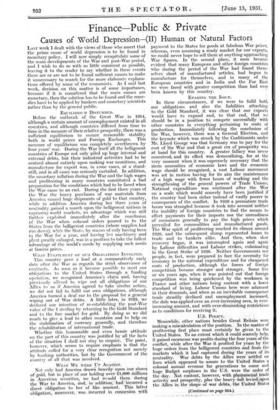EVADING THE ISSUE.
In these circumstances, if we were to fulfil both our obligations and also the liabilities attaching to the Gold Standard, it was clear that our exports -would have to expand and, to that end, that we should be in a --position to compete successfully with other countries in everything pertaining to costs of production. Immediately following the conclusion of the War, however, there was a General Election, and the keynote which was struck by the Coalitionists under Mr. Lloyd George was that Germany was to pay for the cost of the War and that a great era of prosperity was at hand for this country. A greater fallacy was never conceived, and its effect was demoralizing, for at the very moment when it was supremely necessary that the stern necessities of economic laws and the economic wage should be recognized, a vast Labour movement was set in motion having for its aim the maintenance of a high wage with fewer hours of working and the strengthening of the general powers of Trade Unions, National expenditure was continued after the War on a scale which would scarcely have been justified if the country had been richer instead of vastly poorer in consequence .of the conflict. In 1920 a premature trade boom was strangled because it took into account neither the inability of foreign countries to find the means to effect payments for their imports nor the unreadiness of consumers generally to pay the high prices which prevailed for commodities and manufactured goods. The War spirit of profiteering reached its climax around 1920, and the subsequent slump represented losses to trade and to bankers alike. And then, when slow recovery began, it was interrupted again and again by Labour difficulties and Labour strikes, culminating in the Great Strike of 1926. Neither Governments nor people, in fact, were prepared to face the necessity for economy in the national expenditure and for cheapened costs of production, although the . forces of foreign competition became stronger and stronger. Some five or six years ago, when it was pointed out that foreign competition was being quickened by the workmen in France and other nations being content with a lower standard of living, Labour Unions here were adamant in their demands, and when as an inevitable consequence trade steadily declined and unemployment increased, the dole was applied over an ever-increasing area, in ever- increasing amount, and with ever-diminishing restrictions as to conditions for receiving it.






































 Previous page
Previous page